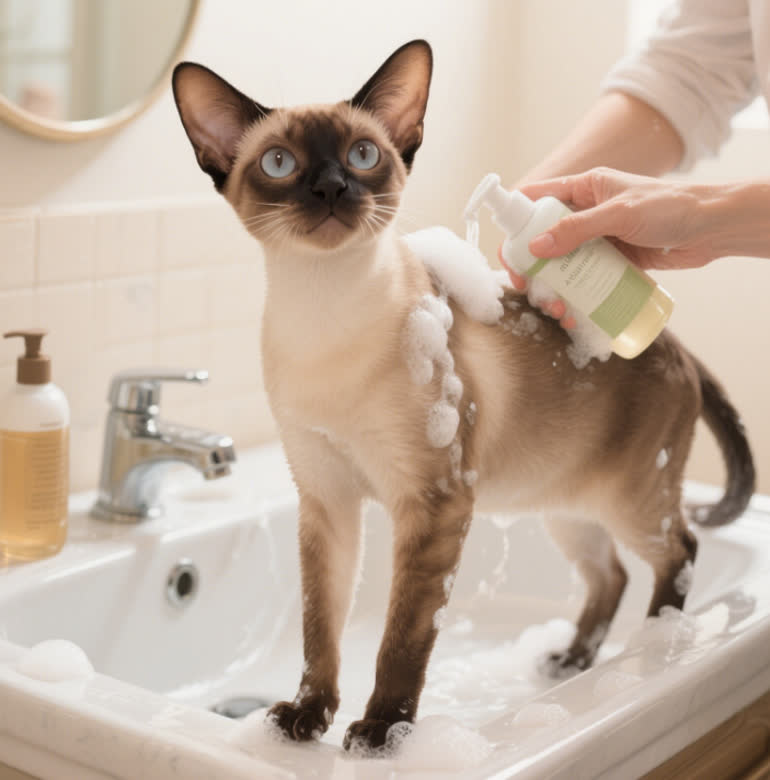The Abyssinian cat breed, celebrated for its ticked coat, playful energy, and curious nature, is a favorite among feline enthusiasts. However, their short, dense fur and sensitive skin make them prone to dryness, allergies, and irritation—issues that demand gentle grooming solutions. Enter organic shampoo for Abyssinian cat sensitive skin, a growing niche in pet care designed to cleanse without harsh chemicals. As of 2024, veterinarians and ethical pet brands are emphasizing toxin-free formulas to protect this breed’s delicate dermal health. This guide explores how to choose, use, and benefit from organic shampoos tailored to your Abyssinian’s needs.
Why Abyssinians Need Specialized Skincare
Abyssinians’ skin is thinner than many breeds, with a higher density of nerve endings and oil glands. Harsh shampoos containing sulfates, parabens, or artificial fragrances can strip natural oils, triggering itching, redness, or hotspots. Dr. Emily Torres, a veterinary dermatologist, notes: “Over 60% of Abyssinian skin issues I treat stem from improper grooming products.” Organic shampoo for Abyssinian cat sensitive skin avoids these irritants, using plant-based surfactants (e.g., coconut-derived cleansers) and pH-balanced formulas to maintain the skin’s protective barrier.
Key Ingredients to Look For (And Avoid)
When evaluating organic shampoo for Abyssinian cat sensitive skin, prioritize these ingredients:
Oatmeal: Soothes inflammation and locks in moisture.
Aloe Vera: Heals minor abrasions from scratching.
Chamomile: Reduces allergic reactions.
Neem Oil: Antibacterial properties combat fungal infections.
Avoid alcohol-based preservatives, synthetic dyes, and sodium lauryl sulfate (SLS), which can worsen sensitivity. Brands like EarthPaws and PurePaws Essentials have earned USDA Organic certification for their Abyssinian-safe formulations.
How to Safely Bathe Your Abyssinian
Frequency: Limit baths to once every 6–8 weeks unless medically advised. Overwashing dries their skin.
Water Temperature: Lukewarm (not hot) water prevents shock to their system.
Application: Dilute organic shampoo for Abyssinian cat sensitive skin with water (1:3 ratio) for easier rinsing.
Post-Bath Care: Pat dry with a microfiber towel and avoid blow-drying unless using a cool setting.
Pro Tip: Pair baths with a silicone brush to distribute natural oils and reduce shedding.
Top 2024 Organic Shampoos for Abyssinians
SensitiveSkin OatBlend (by EarthPaws): Combats dryness with colloidal oatmeal and jojoba oil.
Aloe Relief Wash (PurePaws Essentials): Infused with organic aloe and calendula extract.
Hypoallergenic Neem Formula (GreenGroom): Targets fungal-prone skin with neem and tea tree oil (vet-approved dilution).
CalmCoat Chamomile Shampoo (HerbalPet): Fragrance-free and pH-matched to feline skin.
Note: Always patch-test new products on a small skin area before full use.
DIY Organic Shampoo Recipes
For owners preferring homemade solutions, mix:
½ cup unscented castile soap (organic)
¼ cup coconut milk (moisturizing)
2 tbsp honey (antibacterial)
5 drops lavender oil (calming)
Avoid essential oils like tea tree or citrus, which are toxic to cats. This DIY organic shampoo for Abyssinian cat sensitive skin offers a budget-friendly alternative but lacks preservatives—use within one week.
Common Mistakes to Avoid
Human Shampoos: Their pH (5.5) is too acidic for cats (pH 6.2–7.4).
Over-the-Counter Medicated Shampoos: Can be too harsh without vet guidance.
Skipping Rinsing: Residue from organic shampoo for Abyssinian cat sensitive skin may cause licking-induced irritation.
When to Consult a Veterinarian
Persistent scratching, bald patches, or sores despite using organic shampoo for Abyssinian cat sensitive skin may indicate underlying issues like parasites, autoimmune disorders, or food allergies. Dr. Torres advises: “Organic products are preventive, not curative. Always rule out medical causes first.”
The Future of Organic Cat Grooming
By 2025, brands aim to introduce biodegradable packaging and carbon-neutral production for organic shampoo for Abyssinian cat sensitive skin. Innovations like probiotic-infused shampoos (to boost skin microbiome health) are also in development.
Caring for an Abyssinian’s sensitive skin starts with choosing the right organic shampoo for Abyssinian cat sensitive skin—one that cleanses gently while respecting their biological needs. By prioritizing USDA-certified ingredients and avoiding common irritants, you can keep your Aby’s coat glossy and their skin irritation-free. Explore EarthPaws’ subscription service for regular deliveries tailored to your feline’s grooming schedule.










